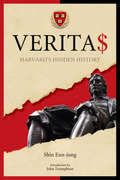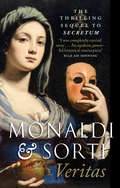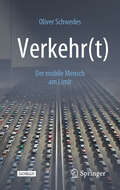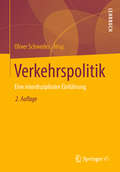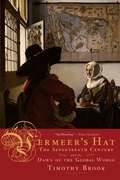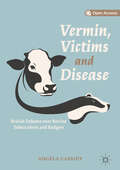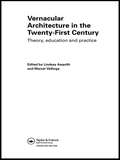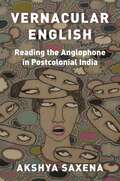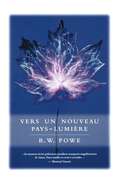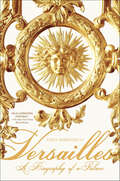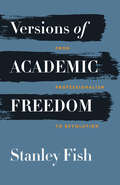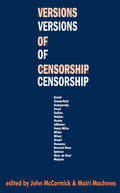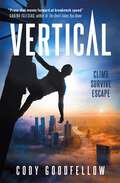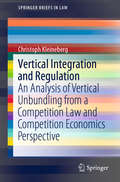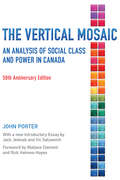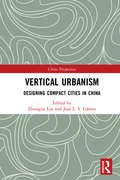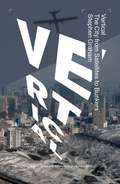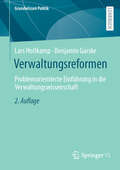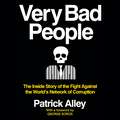- Table View
- List View
Verita$: Harvard's Hidden History
by Shin Eun-Jung John TrumpbourA critical examination of Harvard's monumental but disconcerting global influence and power, this book examines aspects of Harvard's history not generally known. The book begins with analysis of Harvard's involvement in the Salem Witch and Sacco-Vanzetti trials. Similarly disquieting, Harvard provided students as strikebreakers in both the 1912 Bread and Roses textile workers strike and the 1919 Boston police strike. Harvard administrators and scientists promoted eugenics in the early 20th century and had a deep impact on Nazi Germany's race theories. Its contemporary ties to U.S. foreign policy and neoliberalism are also profound. Harvard's management of Russian economic reform left nightmarish memories, and the university was compelled to pay more than $26 million after the U.S. government sued it. The book also examines Harvard's investment policy for its massive endowment, its restrictive labor policies, and its devastation of the adjoining Allston-Brighton neighborhood into which it is expanding. Harvard's motto is "VERITAS," which means "truth" in Latin, and the author explores the ways Harvard has pursued money and power above its quest for truth.
Veritas: The Thrilling Sequel to Secretum
by Rita Monaldi Francesco SortiA spy uncovers a political plot in 18tn century Vienna in this sequel to the acclaimed historical thriller Secretum—&“another tour-de-force of derring do&” (Historical Novel Society).Vienna, 1711. Atto Melani, a spy in the service of Louis XIV, arranges for his faithful helper to relocate from a Roman slum to the imperial court in Vienna. There, Atto enlists his help in a secret mission to bring about the end of the war between France and Austria. Meanwhile, a Turkish delegation has arrived in Vienna for talks with Emperor Joseph I—despite the fact that Austria is supposed to be at peace with the Ottoman Empire. When the emperor suddenly falls ill with smallpox and students are targeted by a serial killer, some fear that a centuries-old power struggle has been reignited. Can Atto and his helper prevent Europe from descending into all-out conflict? An unfinished palace known as the Place with No Name, an exotic menagerie and a fantastical Flying Ship are just some of the ingredients of this baroque spy novel.
Verkehr(t): Der mobile Mensch am Limit
by Oliver SchwedesVerkehr prägt unsere Lebensweise in modernen Gesellschaften. Gleichzeitig trägt er aber auch in wachsendem Maße dazu bei, die Lebensqualität aller Menschen zu beeinträchtigen und ihre Lebensgrundlagen im globalen Maßstab zu zerstören. Oliver Schwedes widmet sich in diesem Sachbuch der Bedeutung des Verkehrs in der Menschheitsgeschichte. Er betrachtet den Verkehr in seiner Janusköpfigkeit und zeigt, wie er den menschlichen Fortschritt lange befördert hat, bevor er sich zunehmend in sein Gegenteil verkehrte. Das Buch ist ein Plädoyer für eine mutige Verkehrspolitik, die mit dem kapitalistischen Paradigma ‚höher-schneller-weiter‘ bricht.
Verkehrsplanung für Einzelhandelsstandorte: Ein Praxisleitfaden
by Siegmar Gumz Claudia Nash Matthias JakobFür eine erfolgreiche Durchführung von Einzelhandelsprojekten stellen die gute Erreichbarkeit sowie die verkehrliche Verträglichkeit zentrale Voraussetzungen dar. Eine umfassende Untersuchung dieser Anforderungen im Rahmen fundierter Verkehrsgutachten entscheidet somit darüber, ob ein Verkehrskonzept dauerhaft tragfähig und wirtschaftlich ist. Dieses Buch liefert einen praxisorientierten und umfassenden Überblick über die einzelnen Arbeitsschritte bei der verkehrlichen Erschließung von Einzelhandelsstandorten. Hierbei wird u.a. für die einzelnen Planungsphasen auf entsprechende zentrale Richtlinien sowie auf Erfahrungen aus der Planungspraxis verwiesen. Es handelt sich um ein übersichtliches Nachschlagewerk für Stadt- und Verkehrsplaner, Architekten sowie alle Akteure, die in die Standortsuche sowie die verkehrliche Erschließung von Einzelhandelsvorhaben eingebunden sind.
Verkehrspolitik: Eine interdisziplinäre Einführung (Springer Nachschlagewissen Ser.)
by Oliver SchwedesDie Besonderheit der Verkehrspolitik besteht darin, dass sie mit dem Querschnitts-Thema Verkehr in viele andere gesellschaftliche Themenfelder hineinragt und umgekehrt auch von diesen beeinflusst wird. Dem entsprechend versammelt dieser Band Expertinnen und Experten unterschiedlichster Disziplinen, die sich jeweils verschiedenen Dimensionen des Verkehrsthemas widmen. Das Ziel ist es, das komplexe Wirkungsgefüge Verkehr vorzustellen und ein Gefühl für die Möglichkeiten und Grenzen verkehrspolitischer Gestaltung zu vermitteln. Die wissenschaftliche Verkehrspolitik ist eine Domäne der Wirtschaftswissenschaften. Bisher fehlte eine Einführung in das Politikfeld Verkehr, die einen interdisziplinären Ansatz verfolgt und auch von Fachfremden und Studierenden benachbarter Disziplinen ohne Vorwissen genutzt werden kann. Der Band bietet erstmals eine allgemeinverständliche Einführung in die wissenschaftliche Verkehrspolitik, die fächerübergreifend angelegt ist und insbesondere ein Angebot für Studierende darstellt.
Verknüpfte Welten: Notizen aus 235 Ländern und Territorien – Band 1 (1960-1999)
by Ludger KühnhardtDie Aufzeichnungen, die Ludger Kühnhardt in 235 Ländern und Territorien der Erde verfasst hat, lassen ein faszinierendes Panorama entstehen, gespiegelt in persönlichen Eindrücken, Begegnungen und Erfahrungen eines in aller Welt tätigen Politikwissenschaftlers und Publizisten. Das Buch rekonstruiert die Verknüpfungen zwischen den Transformationen Europas und dem entstehenden globalen Zeitalter während sechs Jahrzehnten ab 1960 bis zur Schwelle der post-Corona-Welt 2020.
Verknüpfte Welten: Notizen aus 235 Ländern und Territorien – Band 2 (2000-2020)
by Ludger KühnhardtDie Aufzeichnungen, die Ludger Kühnhardt in 235 Ländern und Territorien der Erde verfasst hat, lassen ein faszinierendes Panorama entstehen, gespiegelt in persönlichen Eindrücken, Begegnungen und Erfahrungen eines in aller Welt tätigen Politikwissenschaftlers und Publizisten. Das Buch rekonstruiert die Verknüpfungen zwischen den Transformationen Europas und dem entstehenden globalen Zeitalter während sechs Jahrzehnten ab 1960 bis zur Schwelle der post-Corona-Welt 2020.
Vermeer's Hat: The Seventeenth Century And The Dawn Of The Global World
by Timothy BrookIn this critical darling Vermeer's captivating and enigmatic paintings become windows that reveal how daily life and thought-from Delft to Beijing--were transformed in the 17th century, when the world first became global. <p><p> A Vermeer painting shows a military officer in a Dutch sitting room, talking to a laughing girl. In another canvas, fruit spills from a blue-and-white porcelain bowl. Familiar images that captivate us with their beauty--but as Timothy Brook shows us, these intimate pictures actually give us a remarkable view of an expanding world. The officer's dashing hat is made of beaver fur from North America, and it was beaver pelts from America that financed the voyages of explorers seeking routes to China-prized for the porcelains so often shown in Dutch paintings of this time, including Vermeer's. In this dazzling history, Timothy Brook uses Vermeer's works, and other contemporary images from Europe, Asia, and the Americas to trace the rapidly growing web of global trade, and the explosive, transforming, and sometimes destructive changes it wrought in the age when globalization really began.
Vermin, Victims and Disease: British Debates over Bovine Tuberculosis and Badgers
by Angela CassidyThis open access book provides the first critical history of the controversy over whether to cull wild badgers to control the spread of bovine tuberculosis (bTB) in British cattle. This question has plagued several professional generations of politicians, policymakers, experts and campaigners since the early 1970s. Questions of what is known, who knows, who cares, who to trust and what to do about this complex problem have been the source of scientific, policy, and increasingly vociferous public debate ever since. This book integrates contemporary history, science and technology studies, human-animal relations, and policy research to conduct a cross-cutting analysis. It explores the worldviews of those involved with animal health, disease ecology and badger protection between the 1970s and 1990s, before reintegrating them to investigate the recent public polarisation of the controversy. Finally it asks how we might move beyond the current impasse.
Vernacular Architecture in the 21st Century: Theory, Education and Practice
by Marcel Vellinga Lindsay AsquithThe issues surrounding the function and meaning of vernacular architecture in the twenty-first century are complex and extensive. Taking a distinctively rigorous theoretical approach, this book considers these issues from a number of perspectives, broadening current debate to a wider multidisciplinary audience. These collected essays from the leading experts in the field focus on theory, education and practice in this essential sector of architecture, and help to formulate solutions to the environmental, disaster management and housing challenges facing the global community today.
Vernacular English: Reading the Anglophone in Postcolonial India (Translation/Transnation #45)
by Akshya SaxenaHow English has become a language of the people in India—one that enables the state but also empowers protests against itAgainst a groundswell of critiques of global English, Vernacular English argues that literary studies are yet to confront the true political import of the English language in the world today. A comparative study of three centuries of English literature and media in India, this original and provocative book tells the story of English in India as a tale not of imperial coercion, but of a people’s language in a postcolonial democracy.Focusing on experiences of hearing, touching, remembering, speaking, and seeing English, Akshya Saxena delves into a previously unexplored body of texts from English and Hindi literature, law, film, visual art, and public protests. She reveals little-known debates and practices that have shaped the meanings of English in India and the Anglophone world, including the overlooked history of the legislation of English in India. She also calls attention to how low castes and minority ethnic groups have routinely used this elite language to protest the Indian state.Challenging prevailing conceptions of English as a vernacular and global lingua franca, Vernacular English does nothing less than reimagine what a language is and the categories used to analyze it.
Vers un Pays-Lumiere
by Bruce W. PoweB.W. Powe’s visionary work of political philosophy dares to re-imagine Canada. First conceived in 1993, this fully revised, expanded, updated edition, complete with an inspired new introduction that considers Canada in a post-9/11 context, is a landmark book that has become a classic text for understanding the work-in-progress that is Canada. Countering George Grant’s pessimistic Lament for a Nation, which defined the intellectual climate in Canada for decades, Powe argues that our country is in fact a completely original model of what an enlightened polity might be for the 21st century. Here is a passionately inspired portrait of Canada as a communication state – a counter-nation of loose ties and subtle associations where dialogue, ideas, debate and the exchange of information is the currency that holds us lightly together. Towards a Canada of Light points to the urgent realization of a new and liberating way of what it means to be Canadian.
Versailles: A Biography of a Palace
by Tony Spawforth&“An illuminating portrait&” of the palace―its architecture, its scandals, its politics, and its role in France&’s tumultuous history (The New York Times Book Review). The story of Versailles is one of historical drama, under the last three kings of France's old regime, mixed with the high camp and glamour of the European courts, all in an iconic home for the French arts. The palace itself has been radically altered since 1789, and the court was long ago swept away. Versailles sets out to rediscover what is now a vanished world: a great center of power, seat of royal government, and, for thousands, a home both grand and squalid, bound by social codes almost incomprehensible to us today. Using eyewitness testimony as well as the latest historical research, Tony Spawforth offers the first full account of Versailles in English in over thirty years. Blowing away the myths of Versailles, he analyses afresh the politics behind the Sun King&’s construction of the palace and shows how Versailles worked as the seat of a royal court. He probes the conventional picture of a &“perpetual house party&” of courtiers and gives full weight to the darker side: not just the mounting discomfort of the aging buildings but also the intrigue and status anxiety of its aristocrats. The book brings out clearly the fateful consequences for the French monarchy of its relocation to Versailles and also examines the changing place of Versailles in France&’s national identity since 1789. Includes photographs &“Animates the palace that was home to the most charismatic monarchy in Europe for a century, until the French Revolution . . . well-researched and highly engrossing.&” —Publishers Weekly
Versions of Academic Freedom: From Professionalism To Revolution (The Rice University Campbell Lectures)
by Stanley FishThrough his columns in the New York Times and his numerous best-selling books, Stanley Fish has established himself as our foremost public analyst of the fraught intersection of academia and politics. Here Fish for the first time turns his full attention to one of the core concepts of the contemporary academy: academic freedom. Depending on who’s talking, academic freedom is an essential bulwark of democracy, an absurd fig leaf disguising liberal agendas, or, most often, some in-between muddle that both exaggerates its own importance and misunderstands its actual value to scholarship. Fish enters the fray with his typical clear-eyed, no-nonsense analysis. The crucial question, he says, is located in the phrase #147;academic freedom” itself: Do you emphasize #147;academic” or #147;freedom”? The former, he shows, suggests a limited, professional freedom, while the conception of freedom implied by the latter could expand almost infinitely. Guided by that distinction, Fish analyzes various arguments for the value of academic freedom: Is academic freedom a contribution to society's common good? Does it authorize professors to critique the status quo, both inside and outside the university? Does it license and even require the overturning of all received ideas and policies? Is it an engine of revolution? Are academics inherently different from other professionals? Or is academia just a job, and academic freedom merely a tool for doing that job? No reader of Fish will be surprised by the deftness with which he dismantles weak arguments, corrects misconceptions, and clarifies muddy arguments. And while his conclusion#151;that academic freedom is simply a tool, an essential one, for doing a job#151;may surprise, it is unquestionably bracing. Stripping away the mystifications that obscure academic freedom allows its beneficiaries to concentrate on what they should be doing: following their intellectual interests and furthering scholarship.
Versions of Censorship: An Anthology
by Mairi MacInnesCensorship and all it implies in terms both of our historical understanding and of issues of enormous moment in contemporary life defies brief definition because it is an idea that always engages our prejudices, penetrates to the dim regions where our manners and mores take form, and shapes our attitude to the rule law, while at the same time the responses it evokes, whether pernicious or benevolent, depend upon the actualities of the historical moment. Censorship is fascinating because its theory demands some decision on its practice whenever there is an intellectual or political crisis; it is a measure of individual rationality and liberalism. History, which has accelerated so powerfully in recent decades, has diffused our attention, and we tend to overlook the most urgent of the threats to ourselves from ourselves.Censorship is one of the gauges of civilization, and it has always aroused men's most passionate and partisan feelings. The issues involved exploded into the modern world with John Milton's Areopagitica in 1644, and have become ever more pressing as our world has grown smaller and smaller. This anthology is therefore of urgent relevance to our own lives and times.Milton's thesis rests upon the issue of religious belief, and it introduces the book's first part, "Censorship and Belief." With "Censorship and Fact," the book moves to the conflict of the interests of science and freedom of speech with those of the state. In "Censorship and the Imagination," the issue turns on the question of what art is and how it functions in society. And, finally, comes "Self-Censorship," with Dostoievsky and Freud opening up that modern vista where neurosis and politics meet.
Vertical
by Cody GoodfellowA group of urbex explorers breaking into the world&’s tallest skyscraper in Moscow grapple with dangers from all sides in this pulse-pounding cinematic thriller for readers of Gregg Hurwitz and Patrick Hoffman.Michael Foster, Cam Buckley and Maddie Acosta – all former activists in the infamous urbex crew Les Furies. Together they scaled buildings, broke into the spaces no-one else could, and chased a rush that still haunts them. Now though, Michael is stuck recovering from an injury, coding in a dead-end start-up, But Les Furies cannot hide forever. A journalist has uncovered Michael&’s identity and he is being sent anonymous videos of his time in the crew. When he discovers that Cam and Maddie are planning on reuniting the crew one last time, to scale the Korova Tower in Moscow, he is sceptical. But the tower has never been scaled before. Breaking into the world&’s tallest building on Russia Day is too good an opportunity to pass him by. But Michael is about to discover that the vertical city has another purpose, one far more sinister than he could have imagined, and this one final ride for Les Furies might well be the last thing any of them ever do.
Vertical Integration and Regulation: An Analysis of Vertical Unbundling from a Competition Law and Competition Economics Perspective (SpringerBriefs in Law)
by Christoph KleinebergThis book investigates under which circumstances vertical unbundling can lead to a more efficient market result. The assessment is based on an interdisciplinary approach combining law and economics. Drawing on the assessment, circumstances are subsequently presented under which unbundling might become necessary. Additionally, less severe means of regulatory intervention are suggested in order to protect competition. Given its scope, the book is chiefly intended for scholars and practitioners in the field of economic policy and regulation law; in addition, it will give interested members of the public a unique opportunity to learn about the underlying rationales of regulation law and regulation economics.
Vertical Mosaic
by John PorterJohn Porter's landmark study of social and ethnic inequality, The Vertical Mosaic, became an instant classic when it was first published in 1965. A national best seller that sold more than 100,000 copies, the book was the first major study of Canada's class structure and one of the foundational texts in Canadian sociology. Sociologist Irving Louis Horowitz described it as "the sociological study of present-day Canada."Fifty years later, the book retains vast significance both for its powerful critique of social exclusivity in a country that prides itself on equality and diversity and for its influence on generations of sociological researchers. The 50th Anniversary Edition features new material which contextualizes the legacy of this important book: a foreword by Porter's colleague, Wallace Clement, and his biographer, Rick Helmes-Hayes, and a new introductory essay by historian Jack Jedwab and sociologist Vic Satzewich.
Vertical Urbanism: Designing Compact Cities in China (China Perspectives)
by Zhongjie Lin José L. GámezStudies of compact cities have evolved along with the rising awareness of climate change and sustainable development. Relevant debates, however, reveal that the prevailing definitions and practices of compact cities are tied primarily to traditional Western urban forms. This book reinterprets "compact city", and develops a ground-breaking discourse of "Vertical Urbanism", a concept that has never been critically articulated. It emphasizes "Vertical Urbanism" as a dynamic design strategy instead of a static form, distinguishing it from the stereotyped concept of "vertical city" or "towers in the park" dominant in China and elsewhere, and suggests its adaptability to different geographic and cultural contexts. Using Chinese cities as laboratories of investigation, this book explores the design, ecological, and sociocultural dimensions of building compact cities, and addresses important global urban issues through localized design solutions, such as the relationship between density and vitality, the integration of horizontal and vertical dimensions of design, and the ecological and social adaptability of combinatory mega-forms. In addition, through discussions with scholars from the United States, China, and Japan, this book provides an insight into the theoretical debates surrounding "compact city" and "Vertical Urbanism" in the global context. Scholars and students in architecture and urban planning will be attracted by this book. Also, it will appeal to readers with an interest in urban development and Asian studies.
Vertical: The City from Satellites to Bunkers
by Stephen GrahamA revolutionary reimagining of the cities we live in, the air above us, and what goes on in the earth beneath our feet Today we live in a world that can no longer be read as a two-dimensional map, but must now be understood as a series of vertical strata that reach from the satellites that encircle our planet to the tunnels deep within the ground. In Vertical, Stephen Graham rewrites the city at every level: how the geography of inequality, politics, and identity is determined in terms of above and below.Starting at the edge of earth's atmosphere and, in a series of riveting studies, descending through each layer, Graham explores the world of drones, the city from the viewpoint of an aerial bomber, the design of sidewalks and the hidden depths of underground bunkers. He asks: why was Dubai built to be seen from Google Earth? How do the super-rich in São Paulo live in their penthouses far above the street? Why do London billionaires build vast subterranean basements? And how do the technology of elevators and subversive urban explorers shape life on the surface and subsurface of the earth?Vertical will make you look at the world around you anew: this is a revolution in understanding your place in the world.From the Hardcover edition.
Vertrauen, Misstrauen und Medien
by Bernd BlöbaumVertrauen ist im sozialen Leben und in der Gesellschaft eine wichtige Ressource und Produktivkraft. Das Buch beschreibt in einem konzeptionellen Teil wie sich Vertrauen entwickelt, wie es definiert werden kann und aus welchen Elementen sich ein Vertrauensprozess zusammensetzt. Vorgestellt werden ein Vertrauensmodell sowie Wege, Vertrauen und Misstrauen empirisch zu erforschen. Im empirischen Teil werden Daten aus eigenen repräsentativen Befragungen präsentiert. Dabei werden vertrauensvolle und misstrauische Menschen charakterisiert. Ausführlich werden Medien und Journalismus als Objekte von Vertrauen, Skepsis und Misstrauen behandelt. Dargestellt wird, welche Rolle Medien und Journalismus bei Vertrauen in Politik, Wissenschaft und Religion spielen, bevor bilanzierend reflektiert wird, wie Vertrauen geschaffen und Misstrauen vermieden werden kann.
Verwaltungsreformen: Problemorientierte Einführung in die Verwaltungswissenschaft (Grundwissen Politik)
by Lars Holtkamp Benjamin GarskeMultiple, sich überlagernde Phänomene wie geoökonomische und -politische Wirkungszusammenhänge oder Krisen haben die Ziele und Herausforderungen der öffentlichen Verwaltung zum Teil grundlegend verändert. Vor diesem Hintergrund gibt das Lehrbuch einen aktuellen Überblick über zentrale Verwaltungsreformen und neue Reformleitbilder wie die Bürgerkommune, die Digitalisierung der Verwaltung oder den Abbau von Vetopositionen in Deutschland. Im Mittelpunkt der Analyse steht die Frage, warum vielversprechende Verwaltungsreformen wie New Public Management, Doppik oder Bürgerhaushalte in nicht wenigen Kommunen scheitern und was angesichts dieser Umsetzungsprobleme positiv verändert werden kann. Als wesentliches Rüstzeug für ein erfolgreiches Studium werden den Studierenden anhand von Beispielen aus der Reformpraxis die zentralen Argumentationsschritte der empirischen Verwaltungswissenschaft vermittelt. Für die 2. Auflage wurde das Buch grundlegend überarbeitet und aktualisiert.
Verwaltungswissenschaft: Band 1: Theoretische und methodische Grundlagen
by Eberhard BohneDas Buch bietet eine Einführung in die Verwaltungswissenschaft. Das Buch richtet sich an Studierende aller Fachrichtungen, die sich mit Problemen der öffentlichen Verwaltung befassen, sowie an alle Angehörigen von Verwaltungsberufen innerhalb und außerhalb des öffentlichen Dienstes.
Verwaltungswissenschaft: Band 2: Grundzüge der öffentlichen Verwaltung in Deutschland
by Eberhard Bohne Christian BauerDas Lehrbuch enthält den Besonderen Teil der Verwaltungswissenschaft und knüpft an Bd. 1 mit dem Allgemeinen Teil an. Das Lehrbuch gibt einen systematischen, interdisziplinären Überblick über Aufgaben, Handlungsformen und Organisation, den Öffentlichen Dienst sowie über das Finanz- und Haushaltswesen der öffentlichen Verwaltung in Deutschland. Ausgehend von dem Rollenverhältnis des Bürgers gegenüber der öffentlichen Verwaltung, stellt das Lehrbuch die Haupttypen der öffentlichen Verwaltung dar – Polizei und Ordnungsverwaltung, Wirtschaftsaufsicht, Umweltaufsicht, Leistungsverwaltung, Infrastrukturverwaltung und Ko-Produktion öffentlicher Leistungen durch Bürger und öffentliche Verwaltung. Die Darstellung verbindet eine ökonomische, politische und rechtliche Perspektive. Bd. 1 und 2 bilden zusammen ein umfassendes, systematisches Kompendium der Verwaltungswissenschaft für Studium, Lehre und Praxis.
Very Bad People: The Inside Story of the Fight Against the World’s Network of Corruption
by Patrick Alley*****'Reads like a John le Carré novel but is, in fact, very real.' - The Big Issue'Very Bad People would be a hugely enjoyable thriller if it wasn't all true.' - Isabella Tree, author of Wilding'Global Witness are fearless.' - Gordon Roddick, Campaigner and Co-Founder of the Body Shop'Part true crime tale, part investigative procedural, this is the account of the brilliant and necessary superheroes of Global Witness, whose superpower is the truth.' - Edward Zwick, Director of Blood Diamond 'Very Bad People reads like a non-stop high-speed chase as our fighters against corruption hunt down a litany of criminals and con-men, some on the fringes of our society, some embedded high up within it. It's a great story and an important one.' - David Farr, Screenwriter, The Night Manager'The story told in this book of three youthful idealists who go from eating cold baked beans in a drafty London flat to the Thai-Cambodian border where they posed as traders in illegally felled timber is simply riveting. Don't miss it.' - Misha Glenny, author of McMafia'Alley has produced a clear-eyed account of a world poisoned by dark money, and a welcome reminder that resistance is possible. As it turns out, his book is even more timely than he could have hoped.' - Irish Times'This book is inspirational. It shows how young people with sufficient passion and intelligence have the capacity to go after some of the most powerful governments and corporations and shame, humiliate and just push governments to support important reforms that can make this a more decent world.' - Frank Vogl, Co-Founder of Transparency InternationalArms trafficking, offshore accounts and luxury property deals. Super-yachts, private jets and super-car collections. Blood diamonds, suspect oil deals, deforestation and murder. This is the world of Global Witness, the award-winning organisation dedicated to rooting out worldwide corruption. And this is co-founder Patrick Alley's revealing inside track on a breath-taking catalogue of modern super-crimes - and the 'shadow network' that enables them. VERY BAD PEOPLE is about following the money, going undercover in the world's most dangerous places, and bringing down the people behind the crimes. Case by case we see maverick investigators pitched against warlords, grifters and super-villains who bear every resemblance to The Night Manager's Richard Roper. One dictator's son spent $700 million in just four years on his luxury lifestyle.As they unravel crooked deals of labyrinthine complexity, the team encounter well-known corporations whose operations are no less criminal than the Mafia. This network of lawyers, bankers and real estate agents help park dirty money in London, New York, or in offshore accounts, safe from prying eyes.Patrick Alley's book is a brilliant, authoritative and fearless investigation into the darkest workings of our world - and an inspiration to all of us who want to fight back.
